10 Sir Gawain and the Green Knight – Introduction and Parts 1&2
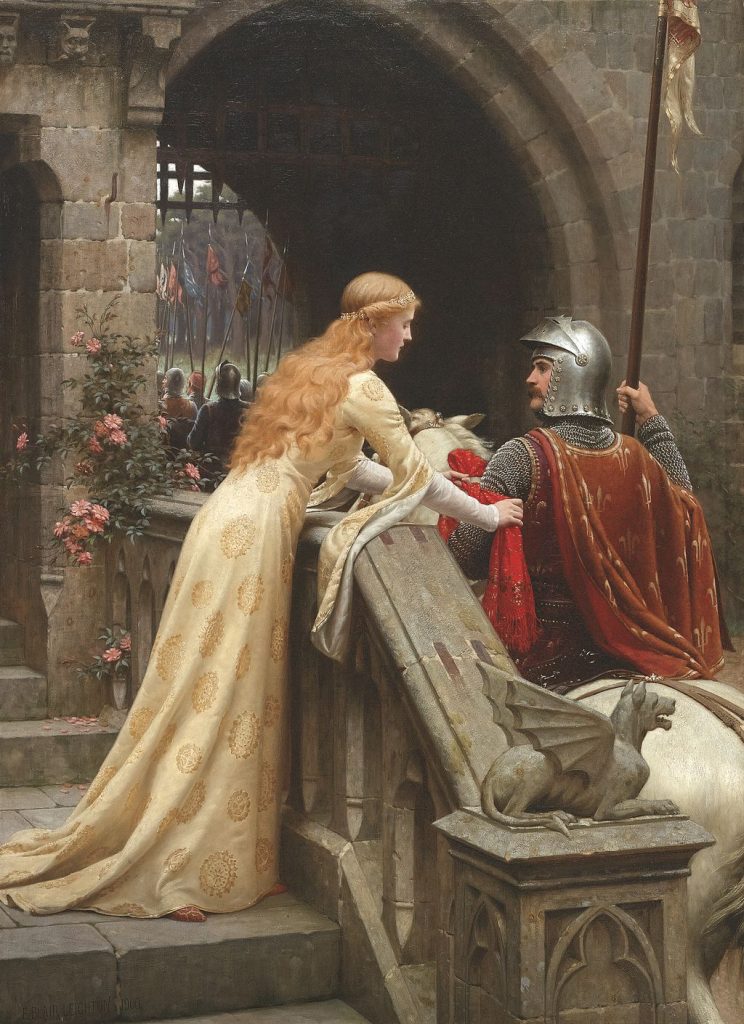 |
Introduction
by Cane Mowry
Written by an unknown author in the 14th century, this adventurous and saucy romance seeks to answer the question of what it means to be chivalrous in the middle ages. This story is told in alliterative verse, each stanza ending with a “bob and wheel” – that is, one short line (the bob) with a single stress, followed by four three-stress lines (the wheel) of which the second and fourth lines rhyme with the bob. This unique poetic rhythm combines with compelling narrative storytelling, vivid world-building and psychological insight that engages the reader in this classic quest. Sir Gawain and the Green Knight is a story that has everything that you would look for in an Arthurian tale: sex, battle, knighthood, mythical creatures, feasts and tests of courage. A grand, coming-of-age story that asks fundamental questions about what it means to be a righteous human being in a brutal world.
The Character of Sir Gawain
Sir Gawain is a knight of the round table, nephew to King Arthur and presented as a devout but “humanly imperfect Christian” in this story (“Sir Gawain and the Green Knight”). He was Arthur’s ambassador to Rome, showed great prowess in battle, but was always surpassed by Lancelot, who was inspired by the power of courtly love, and Perceval, who won the Grail (Hahn). He is usually represented in Middle English poetry as a loyal knight. Gawain is still considered one of the great heroes of Arthurian legend, appearing in more tales than any other knight. Gawain features in a number of works, notably Historia Regum Britanniae, Roman de Brut, De Ortu Waluuanii, Diu Crône, The Awntyrs off Arthure, Le Chevalier à l’épée, and The Weddynge of Syr Gawen and Dame Ragnell, as well as the works of Chrétien de Troyes and the prose cycle Lancelot-Grail (“Gawain”).
Summary
The story begins at the roundtable when a mysterious guest arrives: the Green Knight. He challenges King Arthur to a beheading game – the knight will offer his head in exchange for a chance to do the same to Arthur. Gawain, concerned for his lord’s honor, steps in and agrees to the contest. Dutifully, he cuts the knight’s head off in a single blow; then, the beheaded knight picks his head up and instructs Gawain to seek him out in one year and one day so that he may return the blow.
Act II beings a year later when Gawain heads off to find the green chapel (the home of the Green Knight); he eventually comes upon a hospitable castle instead in the midst of a harsh winter after a long and arduous journey. There, he is welcomed by lord Bertilak and his beautiful wife. He informs them that he is looking for the green chapel; they tell him it is only a little further away and implore him to stay and join their feast in the meantime.
Act III continues with an agreement between Gawain and Bertilak: they will exchange any winnings they have received at the end of each day. As Bertilak hunts in the field, returning each day with meat, Gawain must fend off the advances of Bertilak’s wife. She offers him gifts in exchange for a kiss and each time he demures. In the end, she offers him a protective green girdle that she insists will protect Gawain from all harm in exchange for three kisses. He accepts this offer as he doesn’t want to die just yet but keeps this “winning” a secret from Bertilak.
Act IV follows Gawain as he journeys toward the green chapel; there, he finds the Green Knight casually sharpening his axe. The Green Knight attempts to behead Gawain three times but misses twice; on the third blow, he merely nicks Gawain’s neck. He then reveals himself to have been Bertilak and tells Gawain that his experience at the castle was a game created by Morgan le Fey who had disguised herself as Berilak’s wife. Gawain is deeply ashamed at his own deceit (in wrapping himself in the girdle), though the Green Knight can only laugh and call him the most blameless knight in all the land. Gawain returns to Camelot with the girdle as he knew he failed to fight chivalrously; his fellow knights, however, tell him he is good, and they all wear green sashes in honor of Gawain’s deeds and a reminder to always be honest.
Themes
As in Beowulf, there appears to be a tension between Christian themes and pagan symbolism in this text. Key themes are temptation and testing, virtue, hunting, and the natural world. Green is the most obvious symbol and may allude to the green man of pagan mythology or the worship of nature generally. The number three occurs multiple times in the text and this may signal a nod to the Trinity; it is important to consider as one reads this text that it was composed at a time when “Christian and pagan belief existed side by side” (Armitage).
Works Cited:
Armitage, Simon. Sir Gawain and the Green Knight. BBC Productions. Youtube.com. 17 May 2011. https://www.youtube.com/watch?v=74glI1lg1CQ
“Gawain.” Encyclopedia Britannica, 26 Apr. 2017, www.britannica.com/topic/Gawain.
Hahn, Thomas. “The Greene Knight”. In Sir Gawain: Eleven Romances and Tales. Western Michigan University Medieval Institute Publications, 2000 p. 314.
“Sir Gawain and the Green Knight.” Wikipedia, 31 Jan. 2019, en.wikipedia.org/wiki/Sir_Gawain_and_the_Green_Knight.
Discussion Questions
- There are many symbols in this story – which do you think is the most significant? Did the poetic form help or hinder the reading experience?
- What is the commentary on chivalry here?
- How are the female characters portrayed? Are they strong, cunning or mere plot devices?
- What is the view of King Arthur here? Does it contradict other portrayals? If so, how?
- What might the Green Knight represent?
Further Resources
- Sir Gawain and the Green Knight (BBC Documentary)
- Shmoop’s Page covering themes and background:
- An animated version of the story:
Reading: Sir Gawain and the Green Knight
Part 1
1
Soon as the siege and assault had ceased at Troy,
the burg broken and burnt to brands and ashes,
the traitor who trammels of treason there wrought
was tried for his treachery, the foulest on earth.
It was Aeneas the noble and his high kin
who then subdued provinces, lords they became,
well-nigh of all the wealth in the Western Isles:
forth rich Romulus to Rome rapidly came,
with great business that burg he builds up first,
and names it with his name, as now it has;
Ticius to Tuscany, and townships begins;
Langobard in Lombardy lifts up homes;
and fared over the French flood Felix Brutus
on many banks all broad Britain he settles
then,
where war and wreck and wonder
betimes have worked within,
and oft both bliss and blunder
have held sway swiftly since.
2
And when this Britain was built by this baron rich,
bold men were bred therein, of battle beloved,
in many a troubled time turmoil that wrought.
More flames on this fold have fallen here oft
than any other I know of, since that same time.
But of all that here built, of Britain the kings,
ever was Arthur highest, as I have heard tell.
And so of earnest adventure I aim to show,
that astonishes sight as some men do hold it,
an outstanding action of Arthur’s wonders.
If you will list to this lay but a little while,
I’ll tell it straight, as I in town heard it,
with tongue;
as it was said and spoken
in story staunch and strong,
with linked letters loaded,
as in this land so long.
3
This king lay at Camelot nigh on Christmas
with many lovely lords, of leaders the best,
reckoning of the Round Table all the rich brethren,
with right ripe revel and reckless mirth.
There tourneyed tykes by times full many,
jousted full jollily these gentle knights,
then carried to court, their carols to make.
For there the feast was alike full fifteen days,
with all the meat and mirth men could devise:
such clamour and glee glorious to hear,
dear din in the daylight, dancing of nights;
all was happiness high in halls and chambers
with lords and ladies, as liked them all best.
With all that’s well in the world were they together,
the knights best known under the Christ Himself,
and the loveliest ladies that ever life honoured,
and he the comeliest king that the court rules.
For all were fair folk and in their first age
still,
the happiest under heaven,
king noblest in his will;
that it were hard to reckon
so hardy a host on hill.
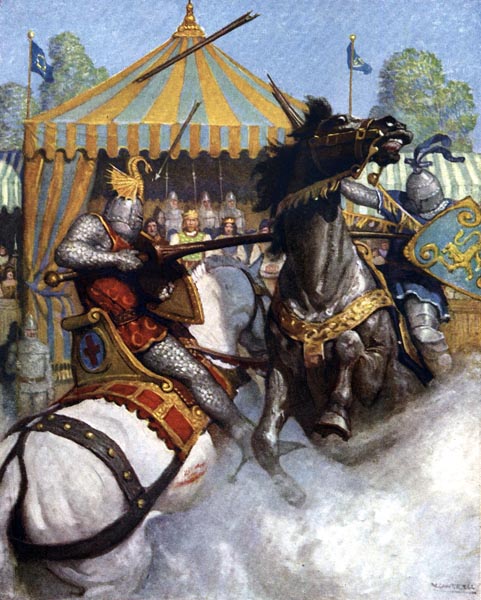
‘Jousted full jollily these gentle knights’
The Boy’s King Arthur (p246, 1922)
Sidney Lanier (1842-1881), Newell Convers Wyeth (1882-1945)
Wikimedia Commons
4
While New Year was so young it was new come in,
that day double on the dais was the dole served,
for the king was come with knights into the hall,
and chanting in the chapel had chimed to an end.
Loud cry was there cast of clerics and others,
Noel nurtured anew, and named full oft;
and see the rich run forth to render presents,
yelled their gifts on high, yield them to hand,
argued busily about those same gifts.
Ladies laughed out loud, though they had lost,
while he that won was not wrath, that you’ll know.
All this mirth they made at the meal time.
When they had washed well they went to be seated,
the best of the barons above, as it seemed best;
with Guinevere, full gaily, gracing their midst,
dressed on the dais there, adorned all about –
splendid silk by her sides, and sheer above
of true Toulouse, of Tartar tapestries plenty,
that were embroidered, bright with the best gems
that might be price-proved with pennies
any a day.
the comeliest to descry
glanced there with eyen grey;
a seemlier ever to the sight,
sooth might no man say.
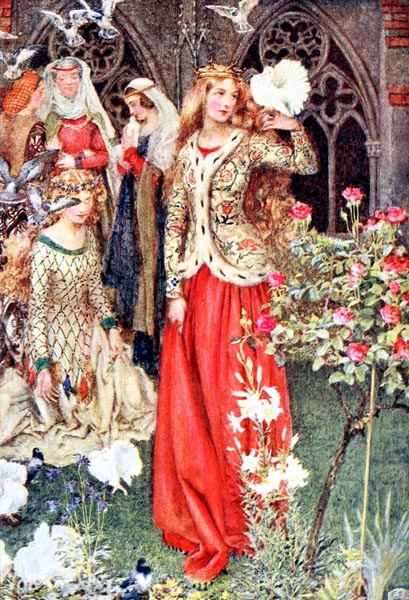
‘Guinevere, full gaily, gracing their midst’
Idylls of the King (p36, 1913)
Baron Alfred Tennyson (1809-1892), Eleanor Fortescue-Brickdale (1872-1945)
The Internet Archive
5
But Arthur would not eat till all were served,
he was so joyous a youth, and somewhat boyish:
he liked his life lively, he loved the less
either to long lie idle or to long sit,
so busied him his young blood and his brain wild.
And also another matter moved him so,
that he had nobly named he would never eat
on such dear days, before he had been advised,
of some adventurous thing, an unknown tale,
of some mighty marvel, that he might believe,
of ancestors, arms, or other adventures;
or else till someone beseeched for some sure knight
to join with him in jousting, in jeopardy to lay,
lay down life for life, allow each to the other,
as fortune might favour them, a fair advantage.
This was the king’s custom when he in court was,
at each fine feast among his many friends
in hall.
Therefore with fearless face
he stands straight and tall;
full lively at that New Year
much mirth he makes with all.
6
Thus there stands straight and tall the king himself,
talking at the high table of trifles full courtly.
There good Gawain was graced by Guinevere beside,
and Agravain a la dure main on the other side sits,
both the king’s sister-sons and full sure knights;
Bishop Baldwin above, he begins the table,
and Ywain, Urien’s son, ate alongside him.
These sat high on the dais and deftly served,
and many another sat sure at the side-tables.
Then the first course came with crack of trumpets,
with many a banner full bright that thereby hung;
new noise of kettledrums and noble pipes,
wild warbles and wide wakened echoes,
that many a heart full high heaved at their notes.
Dainties drawn in therewith of full dear meats,
foods of the freshest, and in such files of dishes
they find no room to place them people before
and to set the silver that holds such servings
on cloth.
Each his load as he liked himself,
there ladled and nothing loath;
Every two had dishes twelve,
good beer and bright wine both.
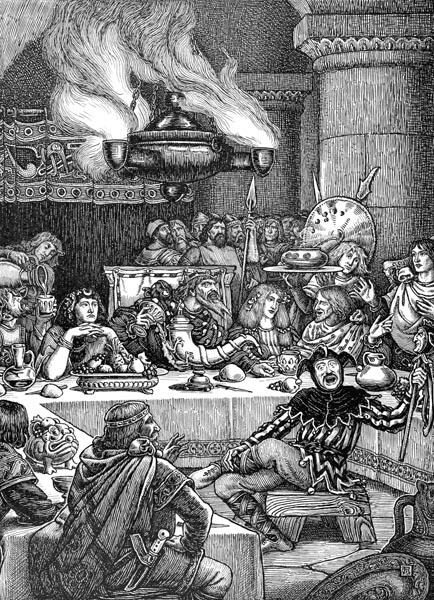
‘Every two had dishes twelve’
Idylls of the King (p56, 1898)
Baron Alfred Tennyson (1809-1892), George Woolliscroft Rhead (1854-1920) and Louis Rhead (1857–1926)
The British Library
7
Now will I of their service say you no more,
for each man may well know no want was there
another noise full new neared with speed,
that would give the lord leave to take meat.
For scarce was the noise not a while ceased,
and the first course in the court duly served,
there hales in at the hall door a dreadful man,
the most in the world’s mould of measure high,
from the nape to the waist so swart and so thick,
and his loins and his limbs so long and so great
half giant on earth I think now that he was;
but the most of man anyway I mean him to be,
and that the finest in his greatness that might ride,
for of back and breast though his body was strong,
both his belly and waist were worthily small,
and his features all followed his form made
and clean.
Wonder at his hue men displayed,
set in his semblance seen;
he fared as a giant were made,
and over all deepest green.
8
And all garbed in green this giant and his gear:
a straight coat full tight that stuck to his sides,
a magnificent mantle above, masked within
with pelts pared pertly, the garment agleam
with blithe ermine full bright, and his hood both,
that was left from his locks and laid on his shoulders;
neat, well-hauled hose of that same green
that clung to his calves and sharp spurs under
of bright gold, on silk stockings rich-barred,
and no shoes under sole where the same rides.
And all his vesture verily was bright verdure,
both the bars of his belt and other bright stones,
that were richly rayed in his bright array
about himself and his saddle, on silk work,
it were tortuous to tell of these trifles the half,
embroidered above with birds and butterflies,
with gay gaudy of green, the gold ever inmost.
The pendants of his harness, the proud crupper,
his bridle and all the metal enamelled was then;
the stirrups he stood on stained with the same,
and his saddle bows after, and saddle skirts,
ever glimmered and glinted all with green stones.
The horse he rode on was also of that hue,
certain:
A green horse great and thick,
a steed full strong to restrain,
in broidered bridle quick –
to the giant he brought gain.
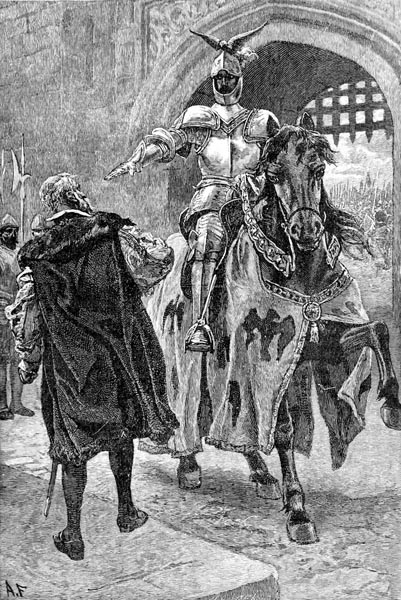
‘A steed full strong to restrain’
The poetical works of Sir Walter Scott (p164, 1888)
Sir Walter Scott (1771-1832) and William James Rolfe (1827-1910), Editor
Internet Archive Book Images
9
Well garbed was this giant geared in green,
and the hair of his head like his horse’s mane.
Fair fanned-out flax enfolds his shoulders;
A beard big as a bush over his breast hangs,
that with the haul of hair that from his head reaches
was clipped all round about above his elbows,
that half his hands thereunder were hid in the wise
of a king’s broad cape that’s clasped at his neck.
The mane of that mighty horse was much alike,
well crisped and combed, with knots full many
plaited in thread of gold about the fair green,
here a thread of the hair, and there of gold.
The tail and his forelock twinned, of a suit,
and bound both with a band of a bright green,
dressed with precious stones, as its length lasted;
then twined with a thong, a tight knot aloft,
where many bells bright of burnished gold ring.
Such a man on a mount, such a giant that rides,
was never before that time in hall in sight of human
eye.
He looked as lightning bright,
said all that him descried;
it seemed that no man might
his mighty blows survive.
10
And yet he had no helm nor hauberk, neither,
nor protection, nor no plate pertinent to arms,
nor no shaft, nor no shield, to strike and smite,
but in his one hand he held a holly branch,
that is greatest in green when groves are bare,
and an axe in his other, one huge, monstrous,
a perilous spar to expound in speech, who might.
The head of an ell-rod its large length had,
the spike all of green steel and of gold hewn,
the blade bright burnished with a broad edge
as well shaped to sheer as are sharp razors.
The shaft of a strong staff the stern man gripped,
that was wound with iron to the wand’s end,
and all engraved with green in gracious workings;
a cord lapped it about, that linked at the head,
and so around the handle looped full oft,
with tried tassels thereto attached enough
on buttons of the bright green broidered full rich.
This stranger rides in and the hall enters,
driving to the high dais, danger un-fearing.
Hailed he never a one, but high he overlooked.
The first word that he spoke: ‘Where is,’ he said,
‘the governor of this throng? Gladly I would
see that soul in sight and with himself speak
reason.’
On knights he cast his eyes,
And rolled them up and down.
He stopped and studied ay
who was of most renown.
11
There was a looking at length the man to behold,
for each man marvelled what it might mean
for a rider and his horse to own such a hue
as grew green as the grass and greener it seemed,
than green enamel on gold glowing the brighter.
All studied that steed, and stalked him near,
with all the wonder of the world at what he might do.
for marvels had they seen but such never before;
and so of phantom and fairie the folk there it deemed.
Therefore to answer was many a knight afraid,
and all stunned at his shout and sat stock-still
in a sudden silence through the rich hall;
as all had slipped into sleep so ceased their noise
and cry.
I think it not all in fear,
but some from courtesy;
to let him all should revere
speak to him firstly.
12
Then Arthur before the high dais that adventure beholds,
and, gracious, him reverenced, a-feared was he never,
and said: ‘Sir, welcome indeed to this place,
the head of this house, I, Arthur am named.
Alight swiftly adown and rest, I thee pray,
and what thy will is we shall wait after.’
‘Nay, so help me,’ quoth the man, ‘He that on high sits:
to wait any while in this way, it was not my errand.
But as the light of thee, lord, is lifted so high,
and thy burg and thy barons the best, men hold,
strongest under steel gear on steeds to ride,
the wisest and worthiest of the world’s kind,
proof to play against in other pure sports,
and here is shown courtesy, as I have heard said,
so then I wandered hither, indeed, at this time.
You may be sure by this branch that I bear here
that I pass by in peace and no plight seek.
For were I found here, fierce, and in fighting wise,
I had a hauberk at home and a helm both,
a shield and a sharp spear, shining bright,
and other weapons to wield, I well will, too;
but as I wish no war, I wear the softer.
But if you be as bold as all bairns tell,
you will grant me goodly the gift that I ask
by right.’
Arthur answered there,
and said: ‘Sir courteous knight,
if you crave battle bare,
here fails you not the fight.’
13
‘Nay, follow I no fight, in faith I thee tell.
About on these benches are but beardless children;
if I were clasped in armour on a high steed,
here is no man to match me, his might so weak.
From thee I crave in this court a Christmas gift,
for it is Yule and New Year, and here many young men.
If any so hardy in this house holds himself,
is so bold of blood, hot-brained in his head,
that dare staunchly strike a stroke for another,
I shall give him as gift this weapon so rich,
this blade, that is heavy enough to handle as he likes,
and I will bear the first blow, as bare as I sit.
If any friend be so fell as to fare as I say,
Leap lightly to me; latch on to this weapon –
I quit claim for ever, he keeps it, his own.
And I will stand his stroke straight, on this floor,
if you will grant me the gift to give him another,
again;
and yet give him respite
a twelvemonth and a day.
Now hurry, let’s see aright
dare any herein aught say.’
14
If he had stunned them at first, stiller were then
all the host in the hall, the high and the low.
The man on his mount he turned in his saddle,
and roundly his red eyes he rolled about,
bent his bristling brows, burning green,
waving his beard about waiting who would rise.
When none would come to his call he coughed full high,
and cleared his throat full richly, ready to speak:
‘What, is this Arthur’s house,’ quoth the horseman then,
‘that all the rumour runs of, through realms so many?
Where now your superiority and your conquests,
your grinding down and your anger, your great words?
Now is the revel and the renown of the Round Table
overthrown with the word of a wanderer’s speech,
for all duck down in dread without dint of a blow!’
With this he laughed so loud that the lord grieved;
the blood shot for shame into his fair face
and there,
he waxed as wrath as wind;
so did all that there were.
The king, so keen by kind,
then stood that strong man near.
15
And said: ‘Horseman, by heaven you ask as a fool,
and as a folly you fain, to find it me behoves.
I know no guest that’s aghast at your great words.
Give me now your weapon, upon God’s name,
and I shall bear you the boon you’d be having.’
lightly he leaped to him and caught at his hand;
then fiercely the other fellow on foot alighted.
Now has Arthur his axe, and the helm grips,
and strongly stirs it about, to strike with a thought.
The man before him drew himself to full height,
higher than any in the house by a head and more.
With stern face where he stood he stroked his beard,
and with fixed countenance tugged at his coat,
no more moved or dismayed by mighty blows
than if any man to the bench had brought him a drink
of wine.
Gawain, that sat by the queen,
to the king he did incline:
‘I beseech in plain speech
that this mêlée be mine’
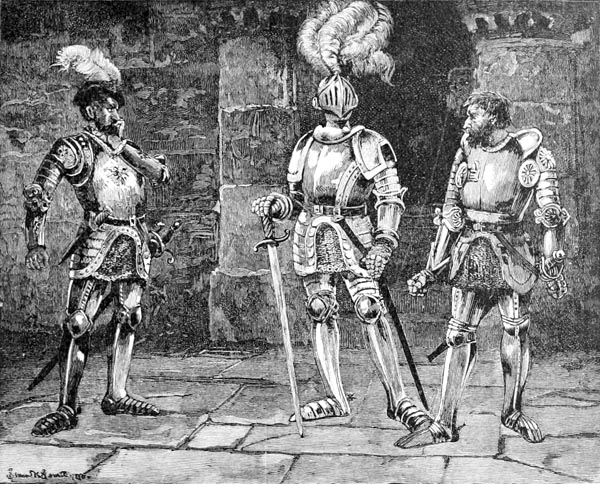
‘I beseech…that this mêlée be mine’
The poetical works of Sir Walter Scott (p70, 1888)
Sir Walter Scott (1771-1832) and William James Rolfe (1827-1910), Editor
Internet Archive Book Images
16
‘Would you, worthiest lord,’ quoth Gawain to the king,
‘bid me bow from this bench and stand by you there,
that I without villainy might void this table,
and if my liege lady liked it not ill,
I would come counsel you before your court rich.
For I think it not seemly, as it is true known,
that such an asking is heaved so high in your hall,
that you yourself are tempted, to take it to yourself,
while so many bold men about you on benches sit,
that under heaven, I hope, are none higher of will,
nor better of body on fields where battle is raised.
I am the weakest, I know, and of wit feeblest.
least worth the loss of my life, who’d learn the truth.
Only inasmuch as you are my uncle, am I praised:
No bounty but your blood in my body I know.
And since this thing is folly and naught to you falls,
and I have asked it of you first, grant it to me;
and if my cry be not comely, let this court be free
of blame.’
Nobles whispered around,
and after counselled the same,
to free the king and crown,
and give Gawain the game.
17
Then commanded the king the knight for to rise,
and he readily up-rose and prepared him fair,
knelt down before the king, and caught the weapon;
and he lightly left it him, and lifted up his hand
and gave him God’s blessing, and gladly him bade
that his heart and his hand should hardy be, both.
‘Take care, cousin,’ quoth the king, ‘how you set on,
and if you read him aright, readily I trow,
that you shall abide the blow he shall bring after.’
Gawain goes to the giant, with weapon in hand,
and boldly abides him, never bothered the less.
Then to Sir Gawain says the knight in the green:
‘Re-affirm we our oaths before we go further.
First I entreat you, man, how are you named,
that tell me truly, then, so trust it I may.’
‘In God’s faith,’ quoth the good knight, ‘Gawain am I,
that bear you this buffet, whatever befalls after,
and at this time twelvemonth take from thee another
with what weapon you wilt, and no help from any
alive.’
The other replies again:
‘Sir Gawain, may I so thrive,
if I am not wondrous fain
for you this blow to drive.’
18
‘By God,’ quoth the green knight, ‘Sir Gawain, I like
That I’ll face first from your fist what I found here.
And you have readily rehearsed, with reason full true,
clearly all the covenant that I the king asked,
save that you shall secure me, say, by your troth,
that you shall seek me yourself, where so you think
I may be found upon field, and fetch you such wages
as you deal me today before this dear company.’
‘Where should I seek,’ quoth Gawain, ‘where is your place?
I know nothing of where you walk, by Him that wrought me,
nor do I know you, knight, your court or your name.
But teach me truly the track, tell me how you are named,
and I shall wind all my wit to win me thither;
and that I swear you in truth, and by my sure honour.’
‘That is enough this New Year, it needs no more,’
quoth the giant in the green to courteous Gawain:
‘if I shall tell you truly, when you have tapped me
and you me smoothly have smitten, I swiftly you teach,
of my house and my home and my own name.
Then may you find how I fare, and hold to your word;
and if I spend no speech, then it speeds you the better,
for you may linger in your land and seek no further –
but oh!
Take now your grim steel to thee,
and see how you fell oaks.’
‘Gladly, sir, indeed,’
quoth Gawain; his axe he strokes.
19
The green knight on his ground graciously stands:
with a little lean of the head, flesh he uncovers;
his long lovely locks he laid over his crown,
and let the naked neck to the stroke show.
Gawain gripped his axe and glanced it on high,
his left foot on the field before him he set,
letting it down lightly light on the naked,
that the sharp of the steel sundered the bones,
and sank through the soft flesh, sliced it in two,
that the blade of the bright steel bit in the ground.
The fair head from the frame fell to the earth,
that folk flailed it with their feet, where it forth rolled;
the blood burst from the body, the bright on the green.
Yet nevertheless neither falters nor falls the fellow,
but stoutly he started forth on strong shanks,
and roughly he reached out, where the ranks stood,
latched onto his lovely head, and lifted it so;
and then strode to his steed, the bridle he catches,
steps into stirrup and strides him aloft,
and his head by the hair in his hand holds.
and as steady and staunch him in his saddle sat
as if no mishap had him ailed, though headless now
instead.
He twined his trunk about,
that ugly body that bled;
many of him had doubt,
ere ever his speech was said.
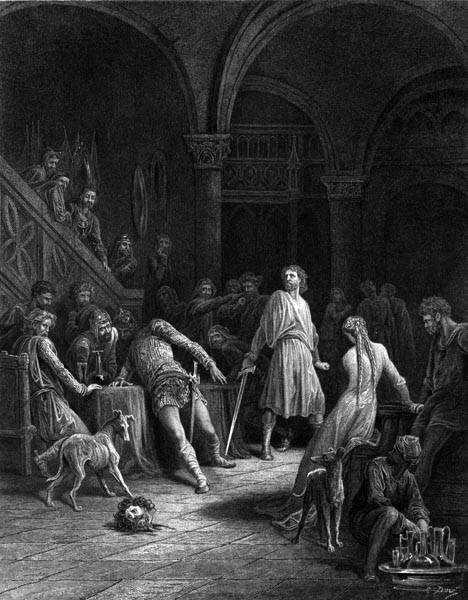
‘The fair head from the frame fell to the earth’
Enid (p118, 1868)
Baron Alfred Tennyson (1809-1892) and Gustave Doré (1832-1883)
The Internet Archive
20
For the head in his hand he holds up even,
towards the dearest on dais addresses the face;
and it lifted its eyelids, and looked full wide,
and made this much with its mouth, as you may now hear;
‘Look, Gawain, be you geared to go as you promised,
and look out loyally till you me, lord, find,
as you swore oath in this hall, these knights hearing.
To the green chapel you go, I charge you, to find
such a dint as you dealt – deserved you have –
to be readily yielded on New Year’s morn.
The knight of the green chapel, men know me as, many;
therefore to find me, if you fain it, you’ll fail never.
Come then, or be called recreant it behoves you.’
With a rough rasping the reins he twists,
hurled out the hall door, his head in his hand,
that the fire of the flint flew from fleet hooves.
to what land he came no man there knew,
no more than they knew where he had come from
what then?
The king and Gawain there
at that green man laugh and grin;
yet broadcast it was abroad
as a marvel among those men.
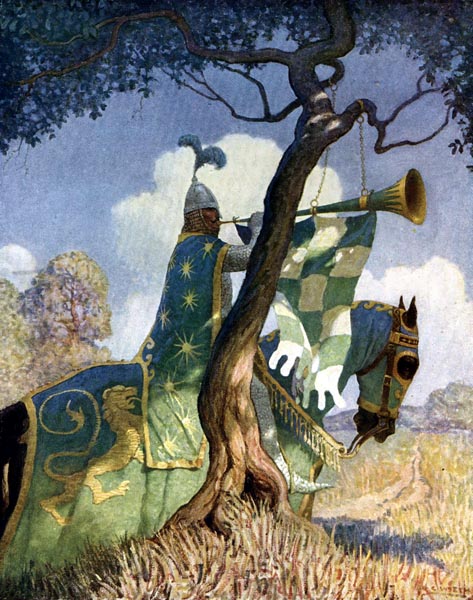
‘To what land he came no man there knew’
The Boy’s King Arthur (p82, 1922)
Sidney Lanier (1842-1881), Newell Convers Wyeth (1882-1945)
Wikimedia Commons
21
Though Arthur the high king at heart had wonder,
he let no semblance be seen, but said aloud
to the comely queen, with courteous speech:
‘Dear dame, today dismay you never;
well become us these crafts at Christmas,
larking at interludes, to laugh and to sing
among the courtly carols of lords and ladies.
Nevertheless my meat I may now me address,
for I have seen my marvel, I may not deny.’
He glanced at Sir Gawain and graciously said:
‘Now sir, hang up your axe that has hewn enough.’
And it adorned the dais, hung on display,
where all men might marvel and on it look,
and by true title thereof to tell the wonder.
Then they went to the board these two together,
the king and the godly knight, and keen men them served
of all dainties double, as dearest might fall,
with all manner of meat and minstrelsy both.
Full well they whiled that day till it worked its end
on land
Now think well, Sir Gawain,
lest by peril unmanned,
this adventure to sustain,
you have taken in hand.
Part II
22
This gift of adventure has Arthur thus on the first
of the young year, for he yearned exploits to hear.
Though words were wanting when they went to sit,
now are they stoked with stern work, fullness to hand.
Gawain was glad to begin those games in hall,
yet if the end be heavy, have you no wonder;
though men be merry in mind when they have strong ale,
a year turns full turn, and yields never a like;
the form of its finish foretold full seldom.
For this Yuletide passed by, and the year after,
and each season slips by pursuing another:
after Christmas comes crabbed Lenten time,
that forces on flesh fish and food more simple.
But then the weather of the world with winter it fights,
cold shrinks down, clouds are uplifted,
shining sheds the rain in showers full warm,
falls upon fair flats, flowers there showing.
Both ground and groves green is their dress,
birds begin to build and brightly sing they
the solace of the soft summer ensuing after
on bank;
and blossoms bloom to blow
by hedges rich and rank,
while noble notes do flow
in woodland free and frank.
23
After, in season of summer with the soft winds,
when Zephyrus sighs himself on seeds and herbs;
well-away is the wort that waxes out there,
when the dunking dew drops from the leaves,
biding a blissful blush of the bright sun.
But then hies Harvest and hardens it soon,
warns it before the winter to wax full ripe;
then drives with drought the dust for to rise,
from the face of the field to fly full high;
wild wind from the welkin wrestles the sun,
the leaves lance then from linden, light on the ground,
and all grey is the grass, that green was ere;
then all ripens and rots, that rose up at first.
And thus wears the year into yesterdays many,
and winter walks again, as the world’s way is,
I gauge,
till Michaelmas moon
threatens a wintry age.
Then thinks Gawain full soon,
of his wearisome voyage.
24
Yet till All-Hallows with Arthur he lingers,
and he made a feast on that day for the knight’s sake,
with much revel and rich of the Round Table.
Knights full courteous and comely ladies,
all for love of that lad in longing they were;
but nevertheless they named nothing but mirth,
many joyless for that gentle soul jokes made there.
For, after meat, with mourning he makes to his uncle,
and speaks his departure, and openly says:
‘Now, liege lord of my life, I ask you leave.
You know the cost in this case, care I no more
to tell you the trial thereof, naught but a trifle;
but I am bound to bear it, be gone, and tomorrow,
to seek the giant in the green, as God will me guide.’
Then the best of the burg were brought together,
Ywain and Eric and others full many,
Sir Dodinal le Sauvage, the Duke of Clarence,
Lancelot and Lionel and Lucan the Good,
Sir Bors and Sir Bedivere, big men both,
and many other men, with Mador de la Porte.
All this courtly company came the king near,
for to counsel the knight, with care in their hearts.
There was much dark dolefulness deep in the hall,
that so worthy as Gawain should wend on that errand,
to endure a dreadful dint, and no more with sword
wander.
The knight made yet good cheer,
and said: ‘Why should I falter?
Such destinies foul or fair
what can men do but suffer?’
25
He dwelt there all that day, and dressed on the morn,
asks early for his arms, and all were they brought.
First a crimson carpet, cast over the floor,
and much was the gilded gear that gleamed thereon.
The strong man steps there, and handles the steel,
dressed in a doublet of silk of Turkestan,
and then a well-crafted cape, clasped at the top,
that with a white ermine was trimmed within.
Then set they the plate shoes on his strong feet,
his legs lapped in steel with lovely greaves,
with knee-pieces pinned thereto, polished full clean,
about his knees fastened with knots of gold;
then the cuisses, that cunningly enclosed
his thick-thewed thighs, attached with thongs;
and then the hauberk linked with bright steel rings
over rich wear, wrapped round the warrior;
and well-burnished bracelets over both arms,
elbow-pieces good and gay, and gloves of plate,
and all the goodly gear that should bring him gain
that tide;
with rich coat armour,
his gold spurs set with pride,
girt with a blade full sure
with silk sword-belt at his side.
26
When he was hasped in armour, his harness was rich;
the least laces or loops gleamed with gold.
So harnessed as he was he hears the Mass,
offered and honoured at the high altar,
then he comes to the king and his companions,
takes his courteous leave of lords and ladies;
and they him kiss and convey, commend him to Christ.
By then Gringolet was game, girt with a saddle
that gleamed full gaily with many gold fringes,
everywhere nailed full new, for that noted day;
the bridle barred about, with bright gold bound;
the apparel of the breast-guard and proud skirts,
crupper, caparison, in accord with the saddle-bows;
and all was arrayed with rich red gold nails,
that all glittered and glinted as gleam of the sun.
Then hefts he the helm, and hastily it kisses,
that was strongly stapled and stuffed within.
It was high on his head, clasped behind,
with a light covering over the face-guard,
embroidered and bound with the best gems
on broad silken border, and birds on the seams,
such as parrots painted preening between,
turtle-doves, true-love knots, so thick entailed
as many burdened with it had been seven winters
in town.
The circlet of greater price
that embellished his crown,
of diamonds all devised
that were both bright and brown.
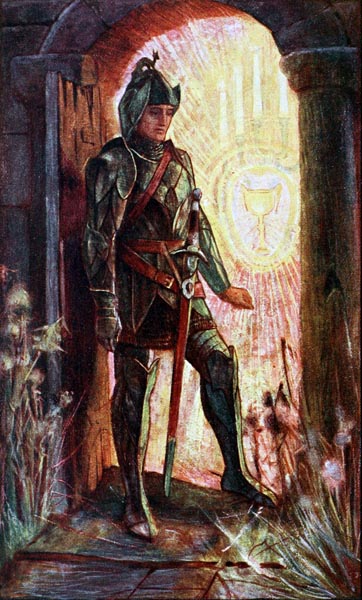
‘So harnessed as he was he hears the Mass’
The Book of Romance (p101, 1902)
Andrew Land (1844-1912)
Internet Archive Book Images
27
Then they showed him the shield that was of shining gules,
with the pentangle painted there in pure gold hues.
He brandishes it by the baldric, casts it about his neck,
that suited the wearer seemly and fair.
And why the pentangle applies to that prince noble,
I intend to tell, though I tarry more than I should.
It is a sign Solomon settled on some while back,
in token of truth, by the title that it has,
for it is a figure that has five points,
and each line overlaps and locks with another,
and everywhere it is endless, and English call it
over all the land, as I here, the Endless Knot.
For so it accords with this knight and his bright arms,
forever faithful in five ways, and five times so,
Gawain was for good known, and, as purified gold,
void of every villainy, with virtues adorned
all, so.
And thus the pentangle new
he bore on shield and coat,
as title of trust most true
and gentlest knight of note.
28
First he was found faultless in his five senses,
and then failed never the knight in his five fingers,
and all his trust in the field was in the five wounds
that Christ caught on the cross, as the creed tells.
And wheresoever this man in mêlée was stood,
his first thought was that, over all other things,
all his force in fight he found in the five joys
that holy Heaven’s Queen had of her child;
for this cause the knight fittingly had
on the inner half of his shield her image painted,
that when he beheld her his boldness never failed.
The fifth five that I find the knight used
was Free-handedness and Friendship above all things;
his Continence and Courtesy corrupted were never,
and Piety, that surpasses all points – these pure five
were firmer founded in his form than another.
Now all these five-folds, forsooth, were fused in this knight,
and each one joined to another that none end had,
and fixed upon five points that failed never,
never confused on one side, nor sundered neither,
without end at any angle anywhere, I find,
wherever its guise begins or glides to an end.
Therefore on his shining shield shaped was the knot
royally with red gold upon red gules,
thus is the pure pentangle called by the people
of lore.
Now geared was Gawain gay,
lifted his lance right there,
and gave them all good day –
as he thought, for evermore.
29
He struck the steed with the spurs, and sprang on his way
so strongly the stone-fire sparked out thereafter.
All that saw the seemly sight sighed in their hearts,
and said softly the same thing all to each other,
in care of that comely knight: ‘By Christ, ‘tis pity,
that you, lord, shall be lost, who art of life noble!
To find his fellow in field, in faith, is not easy.
Warily to have wrought would wiser have been,
to have dealt yon dear man a dukedom of worth.
A loyal leader of this land’s lances in him well seems,
and so had better have been than brought to naught,
beheaded by an elvish man, out of arrogant pride.
Who knew any king ever such counsel to take
as knights in altercations in Christmas games?’
Well was the water warm much wept from eyen,
when that seemly sire spurred from the court
that day.
He made no delay,
but swiftly went his way;
Many a wild path he strayed,
so the books do say.
30
Now rides this knight through the realm of Logres,
Sir Gawain, in God’s name, yet no game it thought.
Oft friendless alone he lay long a-nights,
where he found no fare that he liked before him.
He had no friend but his steed by furze and down,
and no one but God to speak with on the way,
till that he neared full nigh to northern Wales.
All the Isle of Anglesey on the left hand he held,
and fared over the fords by the forelands,
over at Holyhead, till he reached the bank
in the wilderness of Wirral – few thereabouts
that either God or other with good heart loved.
And ever he asked as he fared, of fellows he met,
if they had heard any word of a knight in green,
on any ground thereabout, of the green chapel;
and all met him with nay, that never in their lives
saw they ever a sign of such a one, hued
in green.
The knight took pathways strange
by many a bank un-green;
his cheerfulness would change,
ere might that chapel be seen.
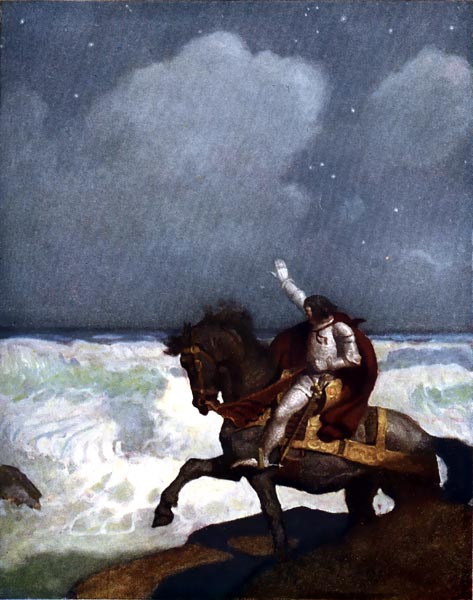
‘The knight took pathways strange by many a bank un-green’
The Boy’s King Arthur (p214, 1922)
Sidney Lanier (1842-1881), Newell Convers Wyeth (1882-1945)
Wikimedia Commons
31
Many cliffs he over-clambered in countries strange,
far flying from his friends forsaken he rides.
at every twist of the water where the way passed
he found a foe before him, or freakish it were,
and so foul and fell he was beholden to fight.
So many marvels by mountain there the man finds,
it would be tortuous to tell a tenth of the tale.
Sometimes with dragons he wars, and wolves also,
sometimes with wild woodsmen haunting the crags,
with bulls and bears both, and boar other times,
and giants that chased after him on the high fells.
had he not been doughty, enduring, and Duty served,
doubtless he had been dropped and left for dead,
for war worried him not so much but winter was worse,
when the cold clear water from the clouds shed,
and froze ere it fall might to the fallow earth.
Near slain by the sleet he slept in his steel
more nights than enough in the naked rocks,
where clattering from the crest the cold burn runs,
and hung high over his head in hard icicles.
Thus in peril and pain, and plights full hard
covers the country this knight till Christmas Eve
alone.
The knight that eventide
to Mary made his moan,
to show him where to ride,
and guide him to some home.
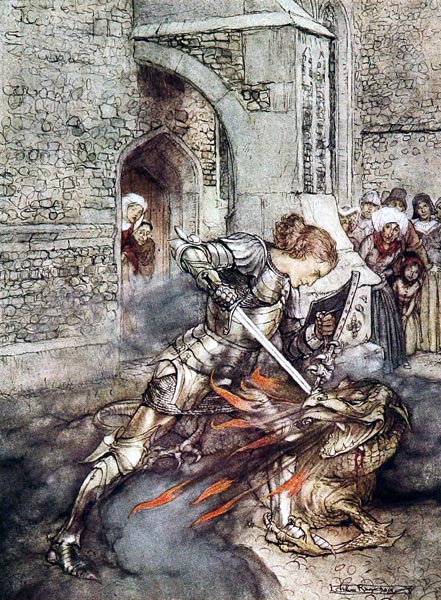
‘Sometimes with dragons he wars’
The Romance of King Arthur and his Knights of the Round Table (p360, 1917)
Sir Thomas Malory (15th cent), Alfred William Pollard (1859-1944), Arthur Rackham (1867-1939)
Internet Archive Book Images
32
By a mount in the morn merrily he rides
into a forest full deep, wonderfully wide,
high hills on either hand, and woodlands under
of hoar oaks full huge a hundred together.
The hazel and the hawthorn were tangled and twined,
with rough ragged moss ravelled everywhere,
with many birds un-blithe upon bare twigs,
that piteously they piped for pinch of the cold.
The gallant on Gringolet glides them under
through many a marsh and mire, a man alone,
full of care lest to his cost he never should
see the service of that Sire, that on that self night,
of a bright maid was born, our burden to quell.
And therefore sighing he said; ‘I beseech thee, Lord,
and Mary, that is mildest mother so dear,
of some harbour where highly I might hear Mass,
and thy Matins tomorrow, meekly I ask,
and thereto promptly I pray my Pater and Ave
and Creed.’
He rode as he prayed,
And cried for his misdeeds;
He crossed himself always,
And said: ‘Christ’s Cross me speed!’
33
Now he had signed himself times but three,
when he was aware in the wood of a wall in a moat,
above a level, on high land locked under boughs
of many broad set boles about by the ditches:
a castle the comeliest that ever knight owned,
perched on a plain, a park all about,
with a pointed palisade, planted full thick,
encircling many trees in more than two miles.
The hold on the one side the knight assessed,
as it shimmered and shone through the shining oaks.
Then humbly has off with his helm, highly he thanks
Jesus and Saint Julian, that gentle are both,
that courtesy had him shown, and his cry hearkened.
‘Now hospitality,’ he said, ‘I beseech you grant!’
Then goads he on Gringolet, with his gilded heels,
and he by chance there has chosen the chief way,
that brought the man bravely to the bridge’s end
in haste.
The drawbridge was upraised,
the gates were firm and fast,
the walls were well arrayed –
it trembled at no wind’s blast.
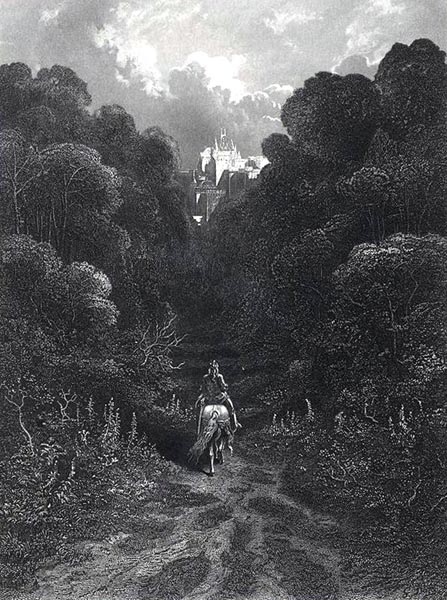
‘A castle the comeliest that ever knight owned’
Élaine (1867)
Baron Alfred Tennyson (1809-1892), Gustave Doré (1832-1883)
34
The knight stuck to his steed, that hugged the bank,
of the deep double ditch driven round the place.
The wall washed in the water wonderfully deep,
and then a full huge height it haled up aloft,
of hard hewn stone to the entablature,
embedded under the battlements in best style;
and there were turrets full tall towering between,
with many lovely loopholes clean interlocked:
a better barbican that knight never beheld.
And innermost he beheld a hall full high,
towers trim between, crenellated full thick,
fair finials that fused, and fancifully long,
with carven copes, cunningly worked.
Chalk white chimneys he descried enough,
on tower rooftops that gleamed full white.
So many painted pinnacles powdered there
among castle crenellations, clustered so thick,
that pared out of paper purely it seemed.
the fair knight on the horse it fine enough thought,
if he might contrive to come the cloister within,
to harbour in that hostel while Holy Day lasted,
all content.
He called and soon there came
a porter pure pleasant.
From the wall his errand he craved,
and hailed the knight errant.
35
‘Good sir,’ quoth Gawain, ‘will you do my errand
to the high lord of this house, harbour to crave?’
‘Yes, by Saint Peter,’ quoth the porter, ‘for I believe
That you’ll be welcome to dwell as long as you like.’
Then the welcomer on the wall went down swiftly,
and folk freely him with, to welcome the knight.
They let down the great drawbridge and dignified
knelt down on their knees upon the cold earth
to welcome this knight as they thought the worthiest way.
They yielded him the broad gate, opened wide,
and he them raised rightly and rode over the bridge.
Several then seized his saddle, while he alighted,
and then strong men enough stabled his steed.
Knights and their squires came down then
for to bring this bold man blithely to hall,
When he lifted his helmet, they hastened forward
to heft it from his hand, the guest to serve;
his blade and his blazon both they took.
then hailed he full handily the host each one,
and many proud men pressed close, that prince to honour.
All clasped in his noble armour to hall they him brought,
where a fair fire on a hearth fiercely flamed.
Then the lord of that land left his chamber
for to meet with manners the man on the floor.
He said: ‘You are welcome to dwell as you like.
What is here, is all your own, to have at your will
and wield you.
‘Graunt merci,’ quoth Gawain,
‘May Christ reward it you.’
As friends that meet again
Each clasped the other true.
36
Gawain gazed on the gallant that goodly him greet,
and thought him a brave baron that the burg owned,
a huge man in truth, and mature in his years;
broad, bright was his beard and all beaver-hued,
stern, striding strongly on stalwart shanks,
face fell as the fire, and free of his speech;
and well he seemed to suit, as the knight thought,
the leading a lordship, along of lords full good.
The chief him led to a chamber, expressly commands
a lord be delivered to him, him humbly to serve;
and there were brave for his bidding a band of men,
that brought him to a bright bower, the bedding was noble,
of curtains of clear silk with clean gold hems,
and coverlets full curious with comely panels,
of bright ermine above embroidered sides,
curtains running on cords, red gold rings,
tapestries tied to the wall, of Toulouse, Turkestan,
and underfoot, on the floor, that followed suit.
There he was disrobed, with speeches of mirth,
the burden of his mail and his bright clothes.
Rich robes full readily retainers brought him,
to check and to change and choose of the best.
Soon as he held one, and hastened therein,
that sat on him seemly, with spreading skirts,
verdant in his visage Spring verily seemed
to well nigh everyone, in all its hues,
glowing and lovely, all his limbs under,
that a comelier knight never Christ made,
they thought.
However he came here,
it seemed that he ought
to be prince without peer
on fields where fell men fought.
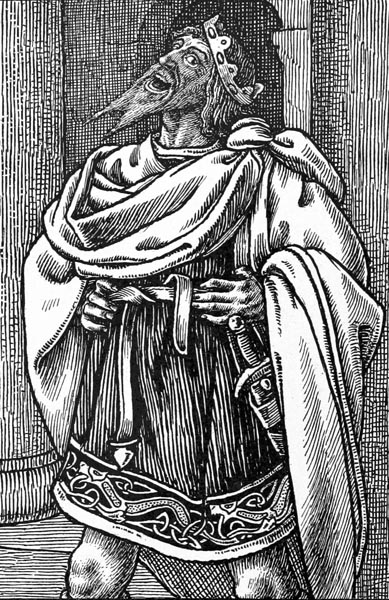
‘A huge man in truth, and mature in his years’
Idylls of the King (p61, 1898)
Baron Alfred Tennyson (1809-1892), George Woolliscroft Rhead (1854-1920) and Louis Rhead (1857–1926)
The British Library
37
A chair before the chimney, where charcoal burned,
graciously set for Gawain, was gracefully adorned,
coverings on quilted cushions, cunningly crafted both.
And then a mighty mantle was on that man cast
of a brown silk, embroidered full rich,
and fair furred within with pelts of the best –
the finest ermine on earth – his hood of the same.
And he sat on that settle seemly and rich,
and chafed himself closely, and then his cheer mended.
Straightway a table on trestles was set up full fair,
clad with a clean cloth that clear white showed,
the salt-cellars, napkins and silvered spoons.
The knight washed at his will, and went to his meat.
Servants him served seemly enough
with several soups, seasoned of the best,
double bowlfuls, as fitting, and all kinds of fish,
some baked in bread, some browned on the coals,
some seethed, some in stews savoured with spices,
and sauces ever so subtle that the knight liked.
While he called it a feast full freely and oft
most politely, at which all spurred him on politely
again:
‘This penance now you take,
after it shall amend.’
That man much mirth did make,
for the wine to his head did tend.
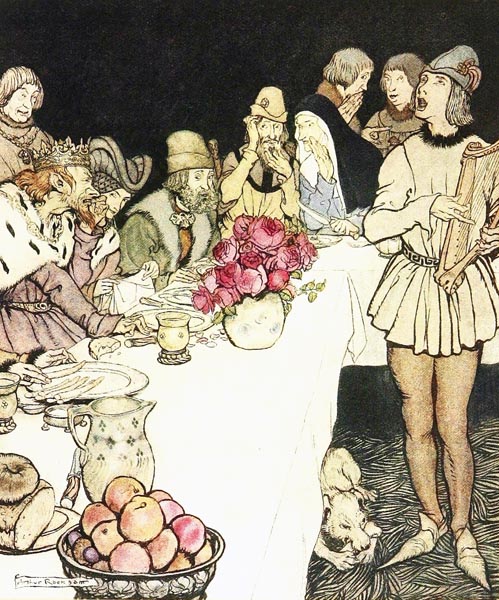
‘The knight washed at his will, and went to his meat’
The Romance of King Arthur and his Knights of the Round Table (p290, 1917)
Sir Thomas Malory (15th cent), Alfred William Pollard (1859-1944), Arthur Rackham (1867-1939)
Internet Archive Book Images
38
Then they sparred and parried in precious style
with private points put to the prince himself,
so he conceded courteously of that court he came,
where noble Arthur is headman himself alone,
that is the right royal king of the Round Table;
and that it is Gawain himself that in that house sits,
come there at Christmas, as chance has him driven.
When the lord learned what prince that he there had,
loud laughed he thereat, so delightful he thought it,
and all the men in that manse made it a joy
to appear in his presence promptly that time,
who all prize and prowess and purest ways
appends to his person, and praised is ever;
above all men upon earth his honour is most.
Each man full softly said to his neighbour:
‘Now shall we see show of seemliest manners
and the faultless phrases of noble speaking.
What superior speech is, unasked we shall learn,
since we have found this fine master of breeding.
God has given us of his goodly grace forsooth,
that such a guest as Gawain grants us to have,
when barons blithe at His birth shall sit
and sing.
The meaning of manners here
this knight now shall us bring.
I hope whoever may hear
Shall learn of love-making.’
39
When the dinner was done and the diners risen,
it was nigh on the night that the time was near.
Chaplains to the chapel took their course,
ringing all men, richly, as they rightly should,
to the holy evensong of that high eventide.
The lord goes thereto and the lady as well;
into a comely enclosure quietly she enters.
Gawain gaily goes forth and thither goes soon;
the lord grasps him by the gown and leads him to sit,
acknowledges him with grace, calls him by name,
and said he was the most welcome man in the world;
and he thanked him thoroughly, they clasped each other,
and sat with sober seeming the service through.
Then liked the lady to look on the knight;
and came from the close with many fine women.
She was the fairest in feature, in flesh and complexion,
and in compass and colour and ways, of all others,
and fairer than Guinevere, as the knight thought.
He strode through the chancel to squire the dame.
Another lady her led by the left hand,
who was older than her, and aged it seemed,
and highly honoured with her men about her.
Not alike though to look on those ladies were,
for if the one was fresh, the other was withered:
rich red in this one distinguished her,
rough wrinkled cheeks on that other, in rolls.
Kerchiefs on this one, with many clear pearls,
her breast and her bright throat bare displayed
shone sweeter than snow that’s shed on the hills;
that other swathed with a wimple wound at the throat,
clothed to her swarthy chin with chalk-white veils,
her forehead folded in silk, enveloped everywhere,
ringed and trellised with trefoils about,
that naught was bare of the lady but the black brows,
the two eyen and nose, the naked lips,
and those were sorry to see, and somewhat bleary –
a great lady on earth a man might her call,
by God!
Her body was short and thick,
her buttocks big and broad;
Much sweeter a sweet to lick
the one at her side for sure.
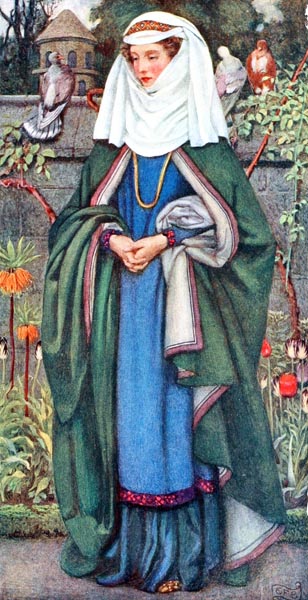
‘She was the fairest in feature’
Idylls of the King (p156, 1913)
Baron Alfred Tennyson (1809-1892), Eleanor Fortescue-Brickdale (1872-1945)
The Internet Archive
40
When Gawain gazed on that gracious-looking girl,
with leave asked of the lord he went to meet them.
The elder he hails, bowing to her full low;
the lovely-looking he laps a little in his arms,
he kisses her courteously and nobly he speaks.
They crave his acquaintance, and he quickly asks
to be their sworn servant, if they themselves wished.
They take him between them, and talking they lead him
to a chamber, to the chimney, and firstly they ask for
spices, which men unstintingly hastened to bring,
and the winning wine with them, every time.
The lord laughing aloft leaps full oft,
minding that mirth be made and many a time,
nobly lifted his hood, and on a spear hung it,
and wished him to win the worth and honour thereof
who most mirth might move at that Christmastide.
‘And I shall swear, by my faith, to strive with the best
before I lose the hood, with the help of my friends.’
Thus with laughing words the lord makes all merry,
for to gladden Sir Gawain with games in the hall
that night.
Till, when it was time,
the lord demanded light.
Gawain his way did find
To bed as best he might.
41
On the morn, when each man minds that time
the dear Lord for our destiny to die was born,
joy waxes in each house in the world for His sake.
So did it there on that day with dainties many:
both when major and minor meals were eaten
deft men on the dais served of the best.
The old ancient wife highest she sits;
the lord, so I believe, politely beside her.
Gawain and the sweet lady together they sat
in the midst, as the masses came together;
and then throughout the hall, as seemed right,
each man in his degree was graciously served.
There was meat, there was mirth, there was much joy,
that it would be a trouble for me to tell all,
and however perchance I pined to make my point.
But yet I know Gawain and the sweet lady
such comfort of their company caught together
through their dear dalliance of courtly words,
with clean courteous chat, closed from filth,
their play surpassed every princely game with which it
compares.
Kettledrums and trumpets,
much piping there of airs;
Each man minded his,
and those two minded theirs.
42
Much mirth was there driven that day and another,
and a third as thickly thronged came in thereafter;
The joy of St John’s Day was gentle to hear,
and was the last of the larking, the lords thought.
There were guests set to go on the grey morn,
so they stayed wonderfully waking and wine drank,
dancing the day in with noble carols.
At the last, when it was time, they took their leave,
each one to wend on his way into strange parts.
Gawain gave them good day, the good man grasps him,
and leads him to his own chamber, the chimney beside,
and there he grips him tight, heartily thanks him
for the fine favour that he had shown him,
so to honour his house on that Christmastide,
and embellish his burg with his bright cheer.
‘Indeed, sir, while I live, I am the better
for Gawain being my guest at God’s own feast.’
‘Graunt merci, sir,’ quoth Gawain, ‘in good faith it’s yours,
all the honour is your own – the High King requite you!
And I am here, at your will, to work your behest,
as I am beholden to do, in high things and low,
by right.’
The lord was at great pains
To keep longer the knight;
To him answers Gawain
That by no means he might.
43
Then the lord aimed full fair at him, asking
what daring deed had him driven at that dear time
so keenly from the king’s court to stray all alone,
before the holy holiday was haled out of town.
‘Forsooth, sir,’ quoth the knight, ‘you say but the truth,
a high errand and a hasty had me from those halls,
for I am summoned myself to seek for a place,
with no thought in the world where to go find it.
I would not dare fail find it by New Year’s morning
for all the land in Logres, so me our Lord help!
So, sir, this request I make of you here,
that you tell me true if ever you tale heard
of the green chapel, on what ground it stands,
and of the knight that keeps it, the colour of green.
There was established by statute a pact us between
both to meet at that mark, if I should live;
and of that same New Year but little is wanting,
and I would look on that lord, if God would let me,
more gladly, by God’s Son, than any goods gain.
So, indeed, by your leave, it behoves me to go.
Now to work this business I’ve barely three days,
and it’s fitter I fall dead than fail of my errand.’
Then, laughing, quoth the lord: ‘Now stay, it behoves you,
for I’ll teach you the trysting place ere the term’s end.
The green chapel upon ground grieve for no more;
but you shall be in your bed, sir, at your ease,
while day unfolds, and go forth on the first of the year,
and come to that mark at mid-morn, to act as you wish
and when.
Dwell until New Year’s Day,
and rise and ride on then.
You shall be shown the way;
it is not two miles hence.’
44
Then was Gawain full glad, and gleefully he laughed:
‘Now I thank you thoroughly beyond all things;
now achieved is my goal, I shall at your will
dwell here, and do what else you deem fit.’
Then the lord seized him and set him beside,
and the ladies had fetched, to please him the better.
There was seemly solace by themselves still.
The lord lofted for love notes so merry,
as one that wanted his wits, nor knew what he did.
Then he cried to the knight, calling aloud:
‘You have deemed to do the deed that I bid.
Will you hold to this promise here and now?’
‘Yes, sire, indeed,’ said the knight and true,
‘While I bide in your burg, I’m at your behest.’
‘As you have travelled,’ quoth the lord, ‘from afar,
and since then waked with me, you are not well served
neither of sustenance nor of sleep, surely I know.
You shall linger in your room and lie there at ease
tomorrow till Mass, and then to meat wend
when you will, with my wife, that with you shall sit
and comfort you with company, till I come to court:
time spend,
And I shall early rise;
a-hunting will I wend.’
Gawain thinks it wise,
as is fitting to him bends.
45
‘And further,’ quoth the lord, ‘a bargain we’ll make:
whatsoever I win in the wood is worthily yours;
and whatever here you achieve, exchange me for it.
Sweet sir, swap we so – swear it in truth –
whether, lord, that way lies worse or better.’
‘By God,’ quoth Gawain the good, ‘I grant it you,
and that you lust for to play, like it methinks.’
‘Who’ll bring us a beverage, this bargain to make?’
so said the lord of that land. They laughed each one,
they drank and dallied and dealt in trifles,
these lords and ladies, as long as they liked;
and then with Frankish faring, full of fair words,
they stopped and stood and softly spoke,
kissing full comely and taking their leave.
By many lively servants with flaming torches,
each brave man was brought to his bed at last
full soft.
To bed yet ere they sped,
repeating the contract oft;
the old lord of that spread
could keep a game aloft.


